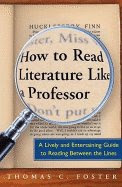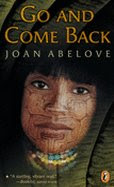








Literature and Language Arts
 Go and Come Back by Joan Abelove.
Go and Come Back by Joan Abelove.In a story of mutual culture shock, Alicia, a young Isabo girl in a remote area of Peru, is just as fascinated by the American anthropologists, Joanna and Margarita, as they are with the ways of her people.
 Bastard out of Carolina by Dorothy Allison.
Bastard out of Carolina by Dorothy Allison.Bone confronts illegitimacy, poverty, the troubled marriage of her mother and stepfather, and the stigma of being considered “white trash” as she comes of age in South Carolina.
 In the Time of Butterflies by Julia Alvarez.
In the Time of Butterflies by Julia Alvarez.The four Mirabel sisters were called the Mariposas, or butterflies. Dede, the only survivor, tells the story of courage that helps liberate the Dominican Republic from the dictator Trujillo.
 Speak by Laurie Halse Anderson.
Speak by Laurie Halse Anderson.Calling the police to a party is a tough choice, but what made Melinda call is the devastating secret that keeps her locked in silence.
 Feed by M.T. Anderson.
Feed by M.T. Anderson.In this society your brain cyberfeed provides an endless stream of information, entertainment and advertising. When Violet’s feed is disrupted, she’s cast adrift and everyone is forced to examine the power of the feed in his/her life.
 Forgotten Fire by Adam Bagdasarian.
Forgotten Fire by Adam Bagdasarian.Based on a true story from the Armenian Holocaust, this is an eloquent, touching and heart-wrenching portrait of pain and triumph during a time of tragedy.
Chambers, Aidan. Postcards from No Man’s Land. New York: Dutton, 2002. Seventeen is an age of self-discovery, and Jacob has gone to Amsterdam to explore his life. His quest strangely parallels discoveries about his grandfather’s life there during World War II.
Cisneros, Sandra. Caramelo. New York: Knopf, 2002. LaLa learns the stories of her Awful Grandmother and weaves them into a colorful family history. The “caramelo,” a striped shawl begun by her Great-Grandmother, symbolizes their traditions.
Frank, E. R. Life is Funny. New York: DK Publishing, 2000. Growing up in New York can be agonizing, humorous, and always a challenge for the teens who tell their stories.
Freymann-Weyr, Garret. My Heartbeat. New York: Houghton Mifflin, 2002. Can Ellen get the boy who loves her brother?
Foster, Thomas. How to Read Literature Like a Professor: a Lively and Entertaining Guide to Reading Between the Lines. New York: HarperCollins, 2003. Every author leaves clues to lead readers deeper into the inner meanings of their writings. Learn how to follow literary breadcrumbs in any story.
Kaplow, Robert. Me and Orson Welles. San Francisco: Macadam/Cage, 2003. What would it be like to spend a week with the great Orson Welles, even sleeping in his pajamas? Richard Samuels, a budding teenaged actor, gets the opportunity to see what life on stage, and behind the stage, is really like on Broadway in 1937.
Kingsolver, Barbara. The Bean Trees. New York: HarperTorch, 1998. Taylor Greer leaves Kentucky and heads west to find a new life. When a baby is abandoned in her car, she learns that responsibilities and independence are not mutually exclusive in this story of family and community.
Lamott, Anne. Bird by Bird: Some Instructions on Writing and Life. New York: Anchor, 1995. Advice to the fledgling writer: “Just take it bird by bird.” A gentle, anecdotal guide for beginning authors.
Mah, Adeline. Chinese Cinderella: the True Story of an Unwanted Daughter. New York: Delacorte, 1999. Wu Mei, also called Adeline, is the Fifth Younger Sister of her family, and the one who bears the blame for all their bad fortune. In her inspirational tale of survival in 1940’s China, she triumphs against all odds.
Myers, Walter Dean. Monster. New York: HarperCollins, 1999. Steve Harmon is accused of being an accomplice to murder. He creates a screenplay of his wrenching experiences at the crime scene, in jail, and on trial.
Nye, Naomi Shihab. 19 Varieties of Gazelle: Poems of the Middle East. New York: HarperCollins, 2002. Another world, another culture -- poems that personalize the conflicts and people, deepening understanding of the impact of September 11th.
O’Connor, Patricia. Woe is I: The Grammarphobe’s Guide to Better English in Plain English. New York: Putnam, 1996. When there’s something important to say, how you say it counts. Pronouns, antecedents and more grammar-ology made fun and painless.
Pullman, Philip. The Golden Compass. New York: Knopf, 1996. Lyra Belacqua, a young girl living in an alternate Oxford, and her daimon, Pantalaimon, set out to find her kidnapped playmate and uncover a sinister plot. Now Lyra must use her special powers to thwart evil and redeem the world.
Reynolds, Sheri. A Gracious Plenty. New York: Harmony Books, 1997. What happens to us when we die? Finch Nobles, a cemetery keeper with horrible burn scars, talks to the dead, and helps them examine what keeps them tied to the earth.
Sapphire. Push. New York: Knopf, 1996. Precious Jones is a survivor. She had her father’s baby at 12 and now, at 16, she is pregnant by him again. But an alternative school, a dedicated teacher, and classmates who understand help her fight back.
Satrapi, Marjane. Persepolis. New York: Pantheon, 2002. Growing up in Iran wasn’t all that bad, or all that different, except that Marjane wanted to be a prophet when she grew up. Dramatic black-and-white illustrations tell her story.
Sebold, Alice. Lucky. New York: Scribner, 1999. “You save yourself or you remain unsaved.” With these words, Sebold recounts the brutal rape that she was “lucky” to survive. Tragedy and hope combine as she makes her way through a survivor’s maze of emotions.
Shakur, Tupac. A Rose that Grew from Concrete. New York: Simon & Schuster, 1999. Written when Tupac was 19 and not yet a star, these poems bring emotion, power and passion to the experience of becoming yourself.
Smith, Anna Deveare. Fires in the Mirror: Crown Heights and Other Identities. New York: Dramatists Play Service, Inc., 1999. A dramatic look at the Crown Heights riots and race in the United States through the voices of 23 fascinating and unique characters, based on interviews with real people.
No comments:
Post a Comment